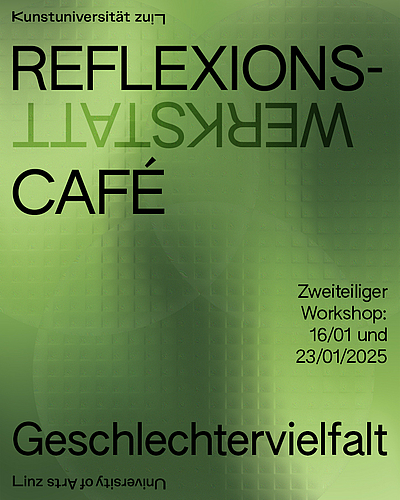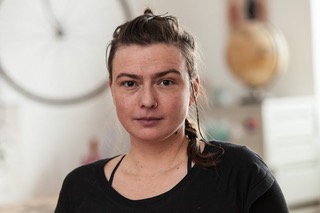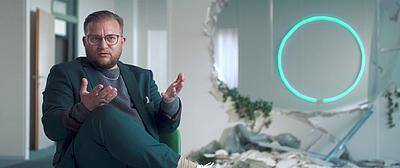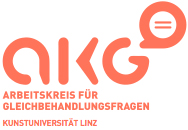Welcome at the Interface Culture program website.
Acting as creative artists and researchers, students learn how to advance the state of the art of current interface technologies and applications. Through interdisciplinary research and team work, they also develop new aspects of interface design including its cultural and social applications. The themes elaborated under the Master's programme in relation to interactive technologies include Interactive Environments, Interactive Art, Ubiquitous Computing, game design, VR and MR environments, Sound Art, Media Art, Web-Art, Software Art, HCI research and interaction design.

The Interface Culture program at the Linz University of Arts Department of Media was founded in 2004 by Christa Sommerer and Laurent Mignonneau. The program teaches students of human-machine interaction to develop innovative interfaces that harness new interface technologies at the confluence of art, research, application and design, and to investigate the cultural and social possibilities of implementing them.
The term "interface" is omnipresent nowadays. Basically, it describes an intersection or linkage between different computer systems that makes use of hardware components and software programs to enable the exchange and transmission of digital information via communications protocols.
However, an interface also describes the hook-up between human and machine, whereby the human qua user undertakes interaction as a means of operating and influencing the software and hardware components of a digital system. An interface thus enables human beings to communicate with digital technologies as well as to generate, receive and exchange data. Examples of interfaces in very widespread use are the mouse-keyboard interface and graphical user interfaces (i.e. desktop metaphors). In recent years, though, we have witnessed rapid developments in the direction of more intuitive and more seamless interface designs; the fields of research that have emerged include ubiquitous computing, intelligent environments, tangible user interfaces, auditory interfaces, VR-based and MR-based interaction, multi-modal interaction (camera-based interaction, voice-driven interaction, gesture-based interaction), robotic interfaces, natural interfaces and artistic and metaphoric interfaces.
Artists in the field of interactive art have been conducting research on human-machine interaction for a number of years now. By means of artistic, intuitive, conceptual, social and critical forms of interaction design, they have shown how digital processes can become essential elements of the artistic process.
Ars Electronica and in particular the Prix Ars Electronica's Interactive Art category launched in 1991 has had a powerful impact on this dialog and played an active role in promoting ongoing development in this field of research.
The Interface Cultures program is based upon this know-how. It is an artistic-scientific course of study to give budding media artists and media theoreticians solid training in creative and innovative interface design. Artistic design in these areas includes interactive art, netart, software art, robotic art, soundart, noiseart, games & storytelling and mobile art, as well as new hybrid fields like genetic art, bioart, spaceart and nanoart.
It is precisely this combination of technical know-how, interdisciplinary research and a creative artistic-scientific approach to a task that makes it possible to develop new, creative interfaces that engender progressive and innovative artistic-creative applications for media art, media design, media research and communication.
Reflexions Werkstatt Café
16. und 23. Jänner 2025, jeweils 10.00 bis 17.00 Uhr Kunstuniversität Linz, Hauptplatz 6, Glashörsäle, 4020 Linz
Geschlechtervielfalt an der Kunstuniversität Linz
Workshop für Angehörige der Kunstuniversität Linz
Der AKG, die Rektorin und die Abteilung Personalentwicklung | Genderfragen laden alle Angehörigen der Kunstuni sehr herzlich ein, daran teilzunehmen! Von Begriffsklärung (trans, inter*, nichtbinär, cis, etc.) bis zur praxisbezogenen Reflexion für den Uni-Alltag steht einiges am Programm.
Es gibt zwei Teilnahmemöglichkeiten:
Option A) 16. und 23. Jänner 2025 (gesamter Workshop), jeweils 10.00 bis 17.00 Uhr;
Option B) nur 16. Jänner 2025, 10.00 bis 17.00 Uhr.
Anmeldung bis 16. Dezember 2024 unter forms.office.com
Programm
Tag 1: 16. Jänner 2025, 10.00 bis 17.00 Uhr
Einführung in das Thema Geschlecht & seine Vielfalt, in wichtige Begriffe, Lebensbedingungen & gesellschaftspolitische Hintergründe; vertiefender Austausch.
10.00 Uhr Begrüßung & Input zu inter*, trans*, nichtbinär (Magdalena Klein & Persson Perry Baumgartinger)
12.30 bis 14.00 Uhr, gemeinsames Mittagessen
14.00 bis 17.00 Uhr, Inhaltlichen Vertiefung & Reflexion
Workshop 1 „Lebensrealitäten für tin Personen“ (Magdalena Klein – VIMÖ)
Workshop 2 „Gesellschaftspolitische Hintergründe im Laufe der Zeit“ (Persson Perry Baumgartinger – TransComm)
Tag 2: 23. Jänner 2025, 10.00 bis 17.00 Uhr
10.00 Uhr, Umsetzung an der Kunstuniversität Linz, Reflexion der eigenen Praxis, gemeinsam verschiedene Möglichkeiten austauschen
Workshop 1 „Handlungsspielräume erkunden“ (Magdalena Klein – VIMÖ)
Workshop 2 „Linguistic Landscaping“ (Persson Perry Baumgartinger – TransComm)
12.30 bis 14.00 Uhr, gemeinsames Mittagessen
14.00 bis 17.00 Uhr, World Café (mit Kaffee & Kuchen), Abschluss “Wrap up & PraxisDenken”
Moderation Persson Perry Baumgartinger – TransComm
Vortragende
Persson Perry Baumgartinger, Mag. Dr.
Gründer von TransComm. Forschen, Vermitteln, Beraten & Kuratieren an den Schnittstellen Sprache & Kommunikation, Trans_Inter*Queer:Nonbinary, Kritisches Diversity & Social Justice, Wissenschaft & Kunst, Diskriminierungskritik. U.a. Universität St. Gallen, Max Reinhardt Seminar, Tanzquartier Wien, museum gugging, Campus Wien Academy, Kunsthalle Wien, Initiative Minderheiten, Kunsthochschule Kassel, Mozarteum & Universität Salzburg.
www.baumgartinger.net
TransComm . Büro für transformative Kommunikation. Beratung, Training & Prozessbegleitung bei Entwicklung und Implementierung von diversitätssensibler, diskriminierungskritischer und geschlechtervielfältiger Unternehmenstransformation.
Let’s do it! Train your communication muscle! To transform your corporate culture. Be part of the transformation revolution!
www.transcomm.net
Magdalena Klein, qualifizierte Peer-Berater*in bei VdG, Mitarbeiter*in von VIMÖ-Verein Intergeschlechtlicher Menschen Österreich, Referent*in Bildungsarbeit VarGes - Beratungsstelle für Variationen der Geschlechtsmerkmale, Schauspieler*in, freie Theaterschaffende,Theater der Unterdrückten Multiplikator*in.
VIMÖ - Verein Intergeschlechtlicher Menschen Österreich
www.vimoe.at
www.varges.at
Eine ReflexionsWerkstattCafé von TransComm Büro für transformative Kommunikation, in Kooperation mit VIMÖ Verein intergeschlechtlicher Menschen Österreich.
QTiezzz on Fire
DRAG CONCERT POETRY SHOW
Event Reflexionscafé Geschlechtervielfalt am 17. Jänner 2025 ab 20.00 Uhr
Ort: DOKAPI – Domgasse 1, 2. Stock
QTiezzz on Fire! Ist aus der Idee entstanden eine Veranstaltung zu starten, die TINA*s feiert (Trans-, Inter-, nicht-binäre- und Agender-Perspectives). Es wird poetische Beiträge von Parham und Wilhelmine Glam geben, ebenso wie Dragnummern und ein Konzert von Valentino Sal und Band. Es kommt the gorgious Eric Big Clit.
Auf der Party wird außerdem für Vimö gesammelt. Mit jedem Drink kannst du 1 € spenden. In diesem Sinne wollen wir euch dazu einladen, im Rahmen einer grandiosen Show die künstlerischen, performativen, trashigen und visuellen Seiten kennenzulernen.
Organized by Petz Haselmayer, Susanne Hinterberger, Justine Maier Ortega, Thomas Obristhofer & Aban Salehi.





